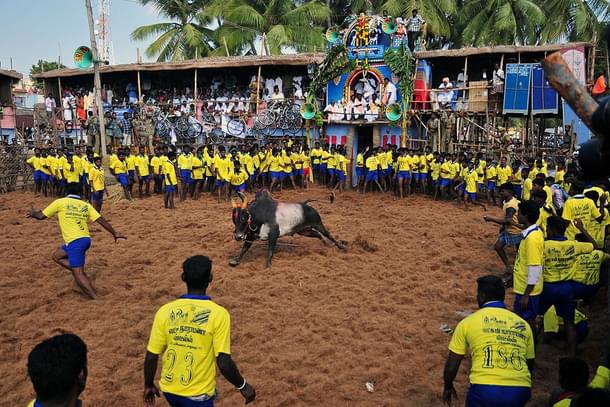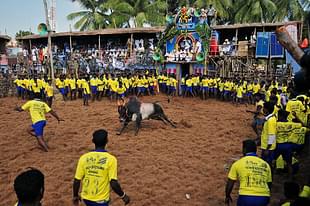Insta
Is Jallikattu A Cultural Right? SC Frames Five Questions, Refers Petitions To Constitution Bench
Swarajya Staff
Feb 02, 2018, 12:58 PM | Updated 12:58 PM IST
Save & read from anywhere!
Bookmark stories for easy access on any device or the Swarajya app.


The Constitution Bench of the Supreme Court will decide whether Jallikattu can be protected as cultural right under Article 29 (1) of the Indian constitution after the apex court referred the issue to the bench today, News18 has reported.
Under Article 29 (1) of the constitution, which is commonly used to protect the interests of minorities, “any section of the citizens residing in the territory of India or any part thereof having a distinct language, script or culture of its own shall have the right to conserve the same”.
In the judgement issued today, a bench of Chief Justice Dipak Misra and Justice R F Nariman framed five questions for the Constitution bench to adjudicate on.
Tamil Nadu and Maharashtra had allowed Jallikattu and bullock cart racing by amending the Prevention of Cruelty to Animals Act, 1960. In December 2017, the apex court said it would refer all pleas challenging the decision made by two state governments to a five-judge constitution bench.
“It will have to be determined whether the Constitution recognises such a cultural right, as claimed by the state. Also to be settled is whether a section of people can invoke Article 29 (1) (protection of interest of minorities) under the Constitution to keep alive the practice,” the court had said.
Referring to Article 25 (right to freedom of religion) and Article 29(1) (protection of cultural and educational rights) of the constitution, the apex court had said they might not allow states to make such laws.
In November last year, the Supreme Court had tagged a plea filed by the People for the Ethical Treatment of Animals (PETA), a controversial animal rights body, challenging Tamil Nadu government’s decision to allow Jallikattu in the state. In its plea, PETA alleged that Jallikattu was a blood sport and harmful to animals involved.
PETA also said that the 2017 Jallikattu Act violates five basic freedoms - the freedom from hunger, malnutrition and thirst; freedom from fear and distress; freedom from physical and thermal discomfort; freedom from pain, injury and disease; and freedom to express normal patterns of behaviour.
On two occasions in the past, the apex court has ruled that Jallikattu amounts to cruelty to animals and can not be permitted.




